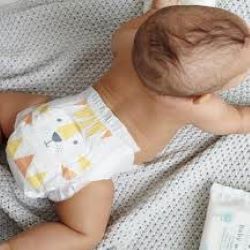What Bin to Use for my Eco Disposable Nappies?

Some of you have got in touch with the following questions about this topic, so we wanted to share with you the correct waste disposal methods for your eco disposable nappies. And to let you know why they are a much better environmental option than conventional disposable nappies.
‘Weird question but what bin in Ireland takes the biodegradable nappies? Will the green bin take them - just some companies are strict’?
‘As they are biodegradable nappies, can you place them in the brown bin? Sorry if that seems like a really silly question’
‘I'm enquiring about the Kit & Kin nappies. Can these be put in your garden compost bin and if so roughly how long do they take to decompose in a compost bin?’
Browse our eco disposable nappy ranges now
How to dispose of your eco nappy:
To properly dispose of your eco nappy, place the nappy IN YOUR REGULAR WASTE BIN. Do not compost them and do not place them in your green recycling bin for the following reasons:
- Human waste isn’t allowed there. Human waste contains bacteria that can contaminate water and harm the surrounding environment, including people.
- Your brown bin/compost bin only works for fully compostable items that will easily break down either in your compost heap or an industrial compost facility where the heat is high enough to break down the biodegradable materials. Eco nappies are made mostly from natural materials but they still have materials that can't break down easily (like the sticky tabs) so they can’t be composted for these reasons.
- Biodegradable isn't the same as compostable - biodegradable can take years to actually break down and it has to be in the right environment.
- No disposable nappy is fully biodegradable or compostable.
So why buy eco nappies if they’re not biodegradable?
There’s lots of really good reasons why they are a far better environmental choice:
- Most of the raw materials from eco nappies come from plants and trees, so when they are incinerated (as most Irish waste is), the carbon dioxide is released to be consumed by other plants or trees. In this way you don’t add more carbon dioxide to the air. Conventional nappies are often composed of up to 80% petroleum-based products – so when they are incinerated they create a huge amount of excess carbon dioxide and toxins in our atmosphere.
- All of the brands we stock (Kit and Kin, Naty and Beaming Baby) contain far fewer chemicals than mainstream brands – so less chemicals going for incineration that create toxic fumes and far fewer chemicals entered into the process in the first place.
- The materials used are more sustainable too – wood pulp from sustainably managed forests is used instead of plastic for the inner core and it’s also chlorine free so again fewer toxins entering the waste stream*. The outer and inner linings are made from plant-derived sustainable materials like corn starch, maize and natural cotton. There aren’t any perfumes, dyes or parabens so less of these chemicals entering the system too.
- Fewer toxic chemicals against your baby’s sensitive skin – the skin is an organ that can absorb toxins, most high street nappies contain lots of chemicals and petroleum-based products.
We love eco nappies for lots of reasons, but mainly because they are from ethical companies who use the most natural materials and processes available, but still the nappies are super soft, super absorbent, great value and more gentle and healthier for your baby.
The eco nappies we stock are all based on natural certified materials, they don’t have oil-based plastic on your baby’s skin, they’re chlorine-free, not bleached, and contain no perfume. You don’t have to drive yourself crazy worrying about nappy rash or scary reactions, as only plant-based materials ever touch your baby’s skin.
The core of an eco disposable nappy like Naty is made from 100% FSC certified wood pulp, which is not only totally natural, but really good at sucking up liquid. The other layers are made of natural materials. And Naty nappies look pretty cool too with their Swedish nature-inspired illustrations.
High Street nappies can use massive amounts of oil-based plastics. Eco nappies are usually completely unbleached, contain no latex, fragrance, or TBT (tributyltin), and are hypo-allergenic.
There are no phthalates, organotins (MBT, DBT, TBT), heavy metals, TCF (Total Chlorine Free), HCHO (formaldehyde), colophonium, AZO-pigments, PVC, and substances known as harmful to health or the environment.
As with any nappy, for maximum performance, when your baby reaches the upper limits of the weight class, we recommend that you switch to the next, larger size.
Summary:
So to sum it up, the only place for disposable nappies is the black bin.
No disposable nappy is yet fully compostable and the brown bin won’t take human waste anyway.
The green recycling bin is only for cardboard, tin and hard plastic - mywaste.ie is a great website to see this updated list and it’s in everyone’s best interest to keep it clean and uncontaminated so that our bin charges don’t get hiked up because of expensive re-sorting.
If you’re really upset at the amount of waste nappies can produce, and you want a totally waste free option, you should consider reusable cloth nappies – they really are very easy to use and very little hassle to wash and dry – and they'll save you a lot of money in the long run too. Have a read of some of our blogs here.
If cloth nappies aren’t for you, you can still feel really good about using eco disposables over regular disposables for all the reasons above!
Browse our eco disposable nappy ranges now
Which brand do you like best?
* Buying these nappies helps reduce the amount of dioxin polluting our air, water and soil and helps make the world a safer, healthier place for your family.

Hi
I have a question about using a vermicomposter to compost nappies, I have read articles which have said this is possible.
Could you send on any advice?
Thanks
Catherine
Hi Catherine. Thanks for getting in touch. Unfortunately I don't know anything about them but I would think that with all the brands we sell, there are too many components that aren't compostable. I'll look into it more too. All the best for now, Siobhan